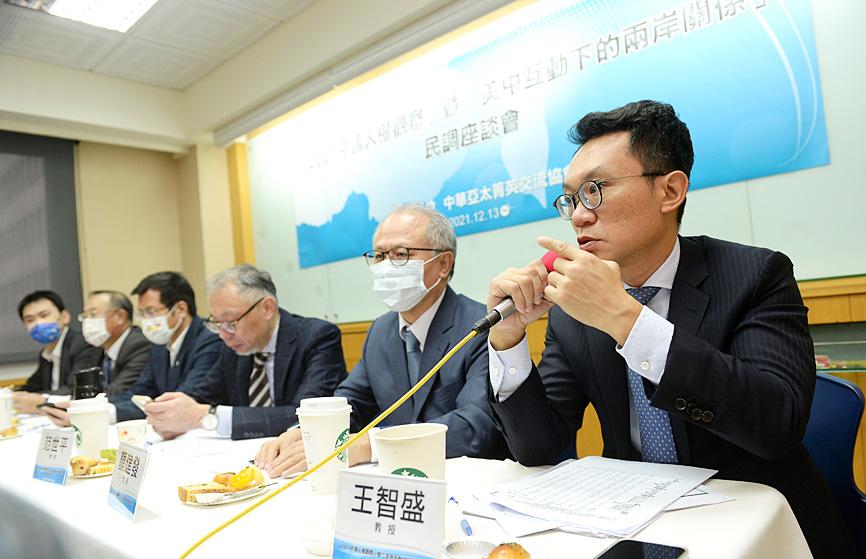Former president Ma Ying-yeou’s (馬英九) comment that Taiwan is no longer a free democracy, but an “illiberal democracy” was opposed by 66.6 percent of respondents to a survey released yesterday by the Asia-Pacific Elite Interchange Association.
A breakdown of the results showed that, at 76.5 percent, respondents aged 20 to 29 disagreed most with his comment, which was made in a letter published on Thursday in the Chinese-language United Daily News.
Ma’s opinion piece, titled “Taiwan is now an ‘illiberal democracy,’” said that actions taken by the Democratic Progressive Party (DPP) administration have made Taiwan deviate further from being a free democracy, adding that President Tsai Ing-wen (蔡英文) has frequently touted the “preciousness of Taiwan’s democratic values,” while at the same time, “she has personally destroyed them.”

Photo: Lin Cheng-kun, Taipei Times
The results showed that 68.9 percent of respondents agreed that Taiwan is among the leading countries with democratic political institutions — the highest agreement was among those aged 20 to 29, followed by those aged 30 to 39.
“The older the age group, the higher the percentage of those who disagreed that Taiwan is a free democracy,” said DPP Legislator Lo Chih-cheng (羅致政), who is an association member.
The survey also asked about the US not inviting China to US President Joe Biden’s Summit for Democracy, with 69.4 percent of respondents saying that Washington was right not to invite Beijing, agreeing that it is a communist, authoritarian regime and has committed human rights violations.
Asked about a diplomatic boycott of the Beijing Winter Olympics, 45.5 percent of respondents agreed that Taiwan should follow in the footsteps of the US, the UK and Australia, while 37.3 percent said they opposed a boycott.
Regarding Nicaragua severing diplomatic ties with Taiwan, 27.1 percent of respondents believed China was most responsible, while 11.3 percent held that Taiwan was the most responsible.
Asked if “Beijing picked the Summit for Democracy as the time for Nicaragua to sever diplomatic ties with Taiwan to challenge its democratic values,” 52.9 percent of respondents agreed, while 32.8 percent disagreed, National Taiwan Normal University political studies professor Fan Shih-ping (范世平) said.
The survey, which the association conducted from Friday to Sunday, collected 1,073 valid responses and has a margin of error of 2.97 percentage points.
Additional reporting by Jason Pan

FREEDOM OF NAVIGATION: The UK would continue to reinforce ties with Taiwan ‘in a wide range of areas’ as a part of a ‘strong unofficial relationship,’ a paper said The UK plans to conduct more freedom of navigation operations in the Taiwan Strait and the South China Sea, British Secretary of State for Foreign, Commonwealth and Development Affairs David Lammy told the British House of Commons on Tuesday. British Member of Parliament Desmond Swayne said that the Royal Navy’s HMS Spey had passed through the Taiwan Strait “in pursuit of vital international freedom of navigation in the South China Sea.” Swayne asked Lammy whether he agreed that it was “proper and lawful” to do so, and if the UK would continue to carry out similar operations. Lammy replied “yes” to both questions. The

‘OF COURSE A COUNTRY’: The president outlined that Taiwan has all the necessary features of a nation, including citizens, land, government and sovereignty President William Lai (賴清德) discussed the meaning of “nation” during a speech in New Taipei City last night, emphasizing that Taiwan is a country as he condemned China’s misinterpretation of UN Resolution 2758. The speech was the first in a series of 10 that Lai is scheduled to give across Taiwan. It is the responsibility of Taiwanese citizens to stand united to defend their national sovereignty, democracy, liberty, way of life and the future of the next generation, Lai said. This is the most important legacy the people of this era could pass on to future generations, he said. Lai went on to discuss

AMENDMENT: Climate change is expected to increase the frequency of high-temperature days, affecting economic productivity and public health, experts said The Central Weather Administration (CWA) is considering amending the Meteorological Act (氣象法) to classify “high temperatures” as “hazardous weather,” providing a legal basis for work or school closures due to extreme heat. CWA Administrator Lu Kuo-chen (呂國臣) yesterday said the agency plans to submit the proposed amendments to the Executive Yuan for review in the fourth quarter this year. The CWA has been monitoring high-temperature trends for an extended period, and the agency contributes scientific data to the recently established High Temperature Response Alliance led by the Ministry of Environment, Lu said. The data include temperature, humidity, radiation intensity and ambient wind,

SECOND SPEECH: All political parties should work together to defend democracy, protect Taiwan and resist the CCP, despite their differences, the president said President William Lai (賴清德) yesterday discussed how pro-Taiwan and pro-Republic of China (ROC) groups can agree to maintain solidarity on the issue of protecting Taiwan and resisting the Chinese Communist Party (CCP). The talk, delivered last night at Taoyuan’s Hakka Youth Association, was the second in a series of 10 that Lai is scheduled to give across Taiwan. Citing Taiwanese democracy pioneer Chiang Wei-shui’s (蔣渭水) slogan that solidarity brings strength, Lai said it was a call for political parties to find consensus amid disagreements on behalf of bettering the nation. All political parties should work together to defend democracy, protect Taiwan and resist